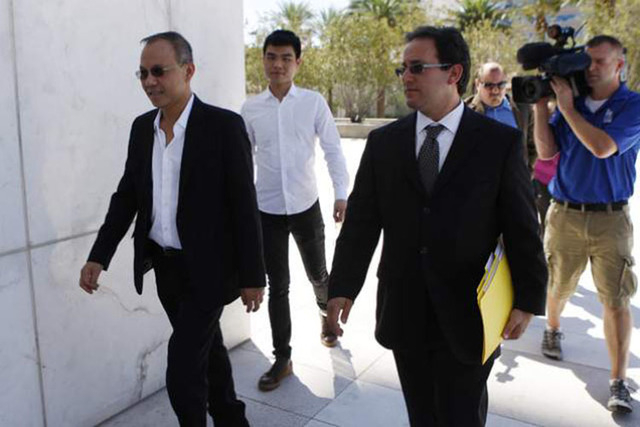Agent testifies about raid on gambling operation

The FBI had to move up a raid on an international gambling operation at Caesars Palace in July because word had slipped out about the investigation, a state gaming agent testified Wednesday.
Ricardo Lopez, who worked undercover for the FBI during the investigation, testified in federal court that a Caesars security officer who had tipped off authorities to the gambling operation told him a top company executive was complaining about not being in the loop of the investigation.
Lopez said agents decided to advance the raid several days to July 9 out of fear word might get back to the high-rolling targets who were staying at three luxury Caesars villas.
Assistant U.S. Attorney Philip Smith Jr. solicited the information from Lopez after defense lawyers bombarded Lopez and an undercover FBI agent in the case with questions about sloppy preparation of a sworn affidavit seeking permission from a federal magistrate judge to search the three villas.
Attorneys David Chesnoff and Thomas Goldstein have criticized investigators during a three-day hearing for withholding information in the affidavit about a ruse agents used to enter one of the villas to gather evidence days earlier.
The agents cut off Internet service inside the villa on Dec. 5 and then entered posing as computer technicians for a Caesars electronics contractor looking to fix the problem.
Lopez testified Wednesday that he saw the two remaining defendants in the case, wealthy Malaysian businessman Paul Phua and his son Darren Phua, sitting behind computer laptops in the villa appearing to be involved in sports betting.
Federal prosecutors have alleged that Phua and his group made a $13 million profit in June and July accepting wagers on the World Cup soccer tournament in Brazil. Five defendants pleaded guilty last week and were sentenced to five years of probation with the condition they stay out of the United States during that period. The case against another defendant was dismissed.
Chesnoff and Goldstein are challenging the constitutionality of the Caesars raid and trying to persuade U.S. Magistrate Judge Peggy Leen to recommend tossing out the evidence agents seized. The attorneys contend the ruse amounted to a warrantless search that violated their clients’ due process rights.
In earlier testimony Wednesday, the undercover FBI agent, Michael Kung, admitted under cross-examination that he made no mention of the ruse in any of his reports and was not aware of any other similar undercover operations.
Mike Wood, a Caesars electronics consultant who helped agents disrupt the Internet service, admitted he once wrote an email to Caesars special investigations director Paul Urban suggesting the ruse would never be made public.
“Glad we could help,” Wood wrote. “Maybe when our contract is up for renewal they will remember this, although no one will ever know.”
Urban testified Tuesday that he didn’t participate in the ruse because of “privacy concerns,” and Wood said Wednesday that he didn’t go undercover with agents into the villa because he feared for his and his employees’ safety.
But agents were able to go undercover themselves with the consent of Wood, who had control over the Internet service.
The hearing — followed closely in the courtroom by Las Vegas FBI chief Laura Bucheit and U.S. Attorney Daniel Bogden — resumes today.